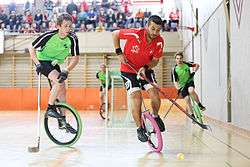Unicycle hockey
 | |
| Highest governing body | International Unicycling Federation |
|---|---|
| First played | Unknown (first record: 1925 in the film Varieté) |
| Characteristics | |
| Contact | No (mild contact is tolerated) |
| Team members | 5 players per side (plus substitutes) |
| Mixed gender | Allowed |
| Equipment | Unicycle, Ice hockey stick and a ball |
| Presence | |
| Olympic | non-Olympic |
.webm.jpg)
Unicycle hockey is a team sport, similar to roller or inline hockey, except that each player must be mounted on a unicycle (with both feet on the pedals) to play the ball. A team is composed of five players (plus substitutes), but there is no dedicated goalkeeper role (although one player usually stays back in that position).[1]
The governing body for unicycle hockey is the International Unicycling Federation which publishes the rules for all unicycle sports. The most recent set of rules for unicycle hockey was published in 2015.[2]
The court used is between 35 and 45 metres in length, and 20 to 25 metres wide. It should have either beveled or rounded corners, and barriers on all sides. The goals are also set back from the end walls so that players can go behind them, similarly to ice hockey.
Any stick which is legal for ice hockey, other than that of a goalkeeper, can be used. The unicycles can have a maximum wheel diameter of 24 inches (61 cm) and a tennis ball is typically used, although street hockey balls are also permitted.
There are three national unicycle hockey leagues: Australia,[3] with 8 teams in 2016; Germany,[4] with 53 teams; Switzerland,[5] with approximately 20 teams
In addition to these leagues, there are clubs and teams in other countries, including England,[6] France, Denmark, Sweden, Hong Kong, Singapore[7] and Korea.[8]